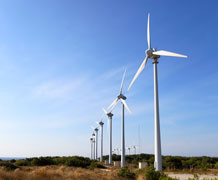
The HELIX project focuses on the impacts of global warming of 2, 4 and 6 °C.
Image courtesy of Shutterstock.
Science for managing climate change risks across Europe under the microscope
An exploration into how science can manage climate change risks across Europe will be presented by an expert from the University of Exeter at the world’s largest climate change talks.
Professor Richard Betts, Chair in Climate Impacts at the University of Exeter, will be part of a delegation presenting at the Conference of Parties, or COP21, in Paris on Thursday, December 10.
The talk will showcase a selection of EU projects and how they complement current climate programmes to improve the science base for informing decision-making on mitigation and resilience to climate change.
The event, which is followed by a Q&A session, will focus on three projects, including the Exeter-lead HELIX (High-End cLimate Impacts and eXtremes) programme.
Professor Betts said: “‘High-end’ climate change means higher than 2°C global warming relative to pre-industrial – we are looking at what the impacts might be if we do exceed this level.”
The HELIX project focuses on the impacts of global warming of 2, 4 and 6 °C, including land and coastal impacts and their consequences for food, water security, energy security, flooding, infrastructure, ecosystems, health, migration, and risk of conflict. All of the project’s results will supported with a comprehensive analysis of confidence and uncertainty. As well as taking a global view, HELIX has three particular regions of study: Europe, Sub-Saharan Africa from Senegal to the Horn of Africa, and India, Bangladesh and Nepal including the Himalayas and the Ganges and Brahmaputra rivers.
The other two projects being presented are: EUCLEIA, which investigates whether climate trends and extreme events are linked to climate change; and EUPORIAS, which develops methods to apply seasonal forecasts to climate services such as forecasting risks to crop yields. Both areas of science are increasingly important as ongoing climate change brings shifting weather patterns and changes in the kind of weather we can expect.
Professor Betts added: “Unless the Paris conference results in a very large reduction in global greenhouse gas emissions over the next few decades , global warming is likely to exceed 2°C. This will increase the risks of many climate hazards, so many aspects of human lifestyles and economies will need to be adapted to ongoing changing conditions.
“Our research will help us prepare and adapt for such changes, to minimise their impacts. It also serves as reminder of what the conference in Paris is ultimately aiming to avoid”.
“The HELIX project is a vital tool in looking beyond the 2˚C boundaries that are being targeted, and looking at the consequences of this on our everyday lives.”
Date: 10 December 2015
